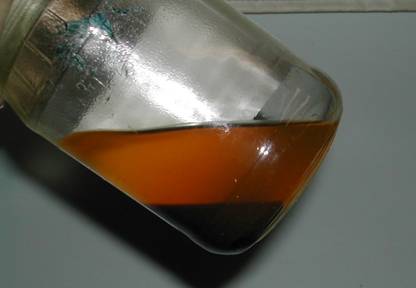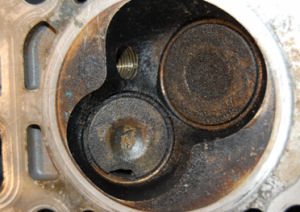Last Chance to Stop E-15 – Or, Your Engine is at Risk
In early March, Growth Energy, an
ethanol lobbying group, and 54 ethanol manufacturers, quietly asked the EPA for
a waiver of the Clean Air Act so that a maximum of 15% ethanol could be added to
gasoline. The EPA is entertaining the waiver and is accepting public comments until
May 21st on the matter. Except for Mr. Williams’ recent TV report and a few newspaper
articles, there has been little press coverage of this impending 50% increase in
ethanol mix by EPA edict.

|
|
This is a sample of fuel from a fuel tank in which phase separation has occurred. The upper phase is gasoline with a reduced level of ethanol. The lower level is a mixture of ethanol and water. |
While engine makers knew about E-10 for over 20 years,
independent 3rd party testing has not been done to discover the effects of E-15
upon engines. In essence, if the EPA approves the waiver, it will be asking the
owners of marine engines to shoulder the risk and the financial burden of
finding out what happens with E-15 in the tank. If there is a problem (as there was with
the introduction of E-10) you will have to pay for the fix from your wallet – no
marine engines are warranted for E-15! This may well be boaters’ last chance to
stop the Farmers’ lobby which is trying to steamroller E-15 into reality.
E-15 has not been approved by ANY marine engine maker. The higher the ethanol content
in a gallon of gas, the more water it can absorb and the more likely it is that
phase separation will occur. Ethanol is a solvent, and the higher its concentration
in fuel, the more powerful a solvent it becomes with the possibility of degrading
rubbers, plastics and other non-metal materials in your engine and fuel system.
Water in the fuel can cause rust in your engine.
Then there is the matter of reduced performance. E-10 has 3% fewer BTUs per gallon,
and E-15 drops to just over a 5% reduction in BTUs. In October 2008 an independent,
non-partisan study was done for the Energy Department. Sixteen late-model cars were
tested with and without E-15. According to the New York Times, the study found,
on average, that mileage dropped 5 percent with E-15 compared with gasoline that
contained no ethanol.

|
| The chipped valve was caused by a lean ethanol mix. |
The fact is that marine engines and fuel systems were just not designed and engineered
to operate on E-15. In a previous article we have shown the damage to valves that
can occur because of a lean mixture which causes the engines to run hot. Ethanol
can dissolve non-metal materials which then gum up carburetors, injectors, valves
and anything else where there have close tolerances.
We at BoatTEST feel that granting the ethanol lobby a waiver precipitously will
only risk costing boat owners both money in repairs, valuable recreational time
lost because of E-15-related breakdowns, and could possibly result in a degradation
in the value of boats.
Please Act Now!
We urge every boater and concerned citizen to write a short note to the man at the
EPA in charge of hearing the public’s opinions on raising the ethanol content in
fuel to 15%. His name is James W. Caldwell, and we are told he is a nice guy with
a very open mind on the subject. Please drop him an email or give him a call.
James W. Caldwell,
Office of Transportation and Air Quality
Email: [email protected]
Phone: 202-343-9393
Fax: 202-343-2080
For the Greater
Good
While it is our mission to protect the interests of boat owners, the fact is that
a 50% increase in the ethanol fuel mix resulting in a 32% of the U.S. corn crop
going into fuel will have economically harmful results for the poorest members of
our society through higher food prices. Indeed, these higher prices will not be
contained by our shores, and will roll right around the world impacting subsistence
families all around the planet. We urge you to read the article below which was
widely circulated by the Associated Press--
A Non-Partisan Report
April 10, 2009
Washington -- The increased use of ethanol could cost the government up to $900
million for food stamps and child nutrition programs, a congressional report says.
Higher use of the corn-based fuel additive accounted for about 10% to 15% of the
rise in food prices from April 2007 to April 2008, according to the nonpartisan
Congressional Budget Office. That translates into higher costs for food programs
for the needy.
The CBO said other factors, such as skyrocketing energy costs, had an even greater
effect than ethanol on food prices during that period.
Food Costs up $5.4 Billion
Economists at the agency estimate that higher food prices will increase costs for
food programs overall to about $5.3 billion in the current budget year.
Ethanol's effect on future food prices is uncertain, the report says, because an
increased supply of corn would have the potential to lower food prices.
Roughly one quarter of corn grown in the United States is used to produce ethanol,
and overall consumption of ethanol in the country hit a record high last year, exceeding
9 billion gallons, according to the CBO. Nearly 3 billion bushels of corn were used
to produce ethanol in the United States last year -- an increase of almost a billion
bushels over 2007.
Mandated Demand
The demand for ethanol was one factor that increased corn prices, leading to higher
animal feed and ingredient costs for farmers, ranchers and food manufacturers.
Some of that cost is eventually passed onto consumers, since corn is used in so
many food products.
Several of those affected groups have banded together to oppose tax breaks and federal
mandates for the fuel.
They said Thursday that the report showed the unintended
consequences of ethanol.
"As startling as these figures are, they do not even tell the story of the toll
higher food prices have taken on working families, nor the impact higher feed prices
have had on farmers in animal agriculture who have seen staggering losses and job
cuts and liquidation of livestock herds," the Grocery Manufacturers Assn., American
Meat Institute, National Turkey Federation and National Council of Chain Restaurants
said in a statement.
Supporters of ethanol disagreed, saying the report was good news.